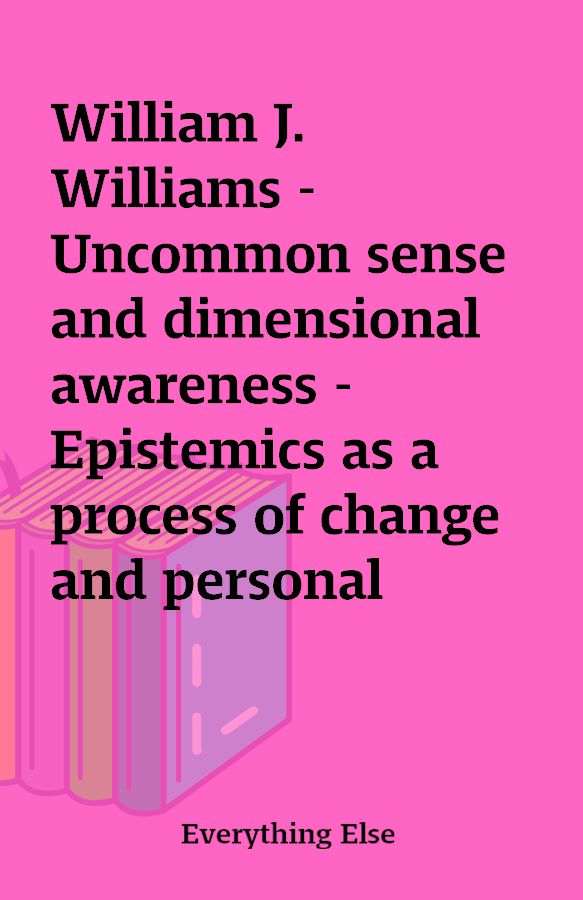William J. Williams – Uncommon sense and dimensional awareness – Epistemics as a process of change and personal transformation
William J. Williams – Uncommon sense and dimensional awareness – Epistemics as a process of change and personal transformation
[ 1 PDF, 1 JPEG ]
Description
**** elib.tech Exclusive ****Help us keep elib.tech all the more special for its exclusivity.Out of respect for the original authors and publishers,please do not make this product available outside of our community.Thanks for keeping elib.tech awesome! GB Status : CLOSED GB Page : Joseph Riggio – Finding Your Essential Self GB This is a book about change and transformation and the “new” process of epistemics. Epistemics takes one to the very nerve center of the change process. The focus is on both the verbal and non-verbal levels, the macroscopic, microscopic, and sub-microscopic levels, and the analytic and synthetic process – – the self and the world. For we are able with this process to connect, epistemologically, the various oligies and the sub-structure which brings them together. This takes us to the assumed cultural processes and invisible change which ushers in macroscopic relations. We are able to be in touch with transaction, emergence, and transformation. We, also, indicate epistemological relationships with physical and social relations; this creates a fusion which provides a new kind of human science.This book moves from new found theory to self, organization, the world, and the cosmos, in general.The individual is at the center of this controversy and he is focused upon as semantic transactor with emphasis on hu-man as an epistemicist.Epistemics is a system by which man can effectively organize and understand his relationship to WIGO (what is going on). The very process of change becomes the “theme, means, and goal” in the act of knowing. Where studies of general semantics are topological in focus, epistemics adds a sense of direction to the study of meaning in that it deals with the substratum of change and how this affects us. Thus the methods of epistemics are ones of inquiry in an effort to know “how come” and how to do.The epistemicist asks such questions as: How does man obtain results? The answer involves an analysis of the nature of administrative moral leadership as well as a creative approach to problem solving. Moreover, an exploration of the will to power syndrome when coupled with transcendental and humanitarian values is directly related to epistemic concerns with man’s struggles to know. Whether interpreting Korzybski’s discussion of the “delayed reaction” or suggesting alternatives to contemporary analyses of social problems, the epistemic emphasis is on “showing interconnectedness.”The process of extensionalization (non-verbal) is related to the process of intensionalization, but the emphasis is placed on the latter in an attempt to make the “uncommon sense” (the synthetic process) a part of the epistemological base. The relationship between the analytic process and the synthetic process is shown to be more complex than previously considered. In all of these discussions (for example in the delineation of the epistemological profile), the focus is kept on man as the center – – the semantic transactor. In the area of defining the meanings of time, for instance, the difference between calendar time and universe time is discussed as follows:Under what instances does this change from nice to know information to need to know information?The answer is: first, to be aware that these worlds exist brings about a change in the state of consciousness. This awareness is necessary for understanding the human condition and how we function with process. Secondly, we dig more deeply into ways of knowing when we begin to understand how we view time. Thirdly, there are times when using this process we will function differently than we were wont to do in both ordinary and extraordinary situations.Epistemics then can aid us in the complex process of reaching the non-verbal and cultural aspects of our functioning, a process touched on but not explicated in Korzybski’s Science and Sanity. lt gives us a method of inquiry that is procedural in nature and develops an overarching theoretical framework to handle particular content or substantive cases effectively. The end result is a new focus on the intuitive part of the decision-making process as the essence of man’s capacity to change.https://www.amazon.com/Uncommon-sense-dimensional-awareness-…
You must be logged in to post a review.






Reviews
There are no reviews yet.